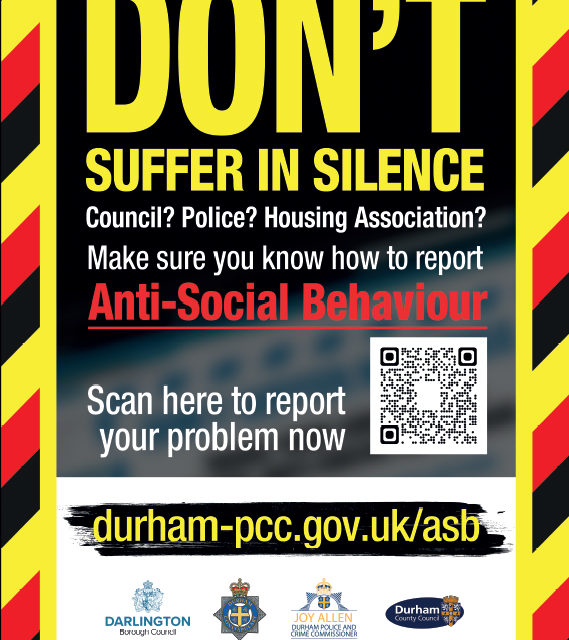A major new campaign to help people take a stand against anti-social behaviour has launched across County Durham and Darlington.
The campaign, funded by the county’s Police and Crime Commissioner Joy Allen, will appear at bus shelters throughout the county and across social media/local newspapers to coincide with national ASB Awareness Week, which runs from July 3-9.
Under the headline, ‘Don’t Suffer In Silence’, the media campaign signposts people to the PCC’s website where they can access relevant support and report ASB to the appropriate agency whether the police, a local council or a housing provider. It also aims to reduce the number of inappropriate calls to the force by making the system for reporting ASB clearer.
The campaign is in direct response to feedback from the public that showed many people still do not know how or who to contact to report ASB. It also highlighted the need for better signposting to services.
The PCC, who has unveiled a series of dedicated information pages on her website to help anyone impacted by ASB, is determined to provide more support to victims of ASB in recognition of the huge toll this behaviour has on emotional and psychological wellbeing.
Following her election in 2021, the Commissioner prioritised ASB in her Police and Crime Plan and became the first PCC in the country to appoint a dedicated Anti-Social Behaviour Champion to give victims of ASB a bigger voice in the justice system and ensure partners work more collaboratively to solve problems.
She has also ensured officers and partners use the full suite of powers available to prevent ASB and has refreshed the ASB Case Review scheme (previously Community Trigger) to make it easier for victims to complain about the handling of their case and seek redress for persistent problems.
Unveiling the campaign, Commissioner Allen said: “I’ve heard some truly horrendous stories from residents involving persistent ASB and I want to make a much bigger difference – nobody should feel like they are fighting this on their own.
“We are not talking about a low-level crime here. ASB causes real and severe emotional distress. It can also be a precursor to more serious offending and must be taken seriously.
“I want to make sure people know who and where to turn if they become a victim of this dreadful behaviour so they can access the support they need as soon as possible. The longer ASB continues, the worse the impact on mental wellbeing.
“The good news we have some fantastic multi-agency resources in place. These processes are ensuring problems are being tackled in the robust way they deserve and that we are maximising the gathering of evidence to prosecute offenders.
“There is no need to suffer in silence. We have people trained and ready to help.”
ASB Awareness Week, organised by Resolve, aims to encourage communities to take a stand against ASB and highlight the ways victims can access help.
This year’s theme is ‘Know Your Rights’ with special focus on the ASB Case Review.
New YouGov research commissioned by Resolve shows that almost one in seven people nationally have had to consider moving home because of the impact ASB was having on their lives.
Durham is one of a small group of forces to be recently included in a national pilot to increase ASB enforcement and trial new ‘community-based’ punishment. The scheme will see perpetrators of ASB forced to undertake reparatory works with 48 hours of the offence being committed to show the community that this behaviour will not be taken lightly.











